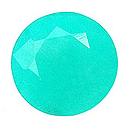|
|
||||||||||||||||
|
||||||||||||||||
|
||||||
|
|
|
|
Chrysocolla
|
|
| | |
| Discovered about 315 BC; IMA status: Valid (pre-IMA; Grandfathered) | ||
|
| ||
|
Chemistry |
|
|
| |
|
(Cu;Al)2H2Si2O5(OH)4 • nH2O | |
|
|
Hydrated Copper Aluminum Silicate Hydroxide |
|
Molecular Weight: |
328.42 gm |
|
Composition: |
Aluminum |
2.05 % |
Al |
3.88 % |
Al2O3 |
|
|
Copper |
33.86 % |
Cu |
42.39 % |
CuO |
|
|
Silicon |
17.10 % |
Si |
36.59 % |
SiO2 |
|
|
Hydrogen |
1.92 % |
H |
17.14 % |
H2O |
|
|
Oxygen |
45.06 % |
O |
|
|
|
|
|
100.00 % |
|
100.00 % |
= TOTAL OXIDE |
|
|
|
||||
|
Classification |
|
|
| |
|
Silicates (Germanates) | |
|
8/E.21-20 | |
|
|
9 : SILICATES (Germanates)
|
|
Related to: |
n/a |
|
Varieties: |
Aluminian Chrysocolla, Aluminian Ferrian Chrysocolla, Cyanochalcite |
|
Synonyms: |
Abdollah-Giw Turquoise, Beaumontite (of Jackson), Chalcostaktite, Chalkostaktite, Chrysocole, Chrysocollite, Chrysokolla, Copper Pitchblende, Cornuite (of Rogers), Crysocolla, Demidovite, Dillenbergite, Liparite (of Casoria), Llanca, Somervillite (of Dufrénoy), |
|
|
|
|
Crystal Data |
|
|
|
|
|
Crystals acicular, to 5 mm, in radiating clusters; fine fibrous, botryoidal, earthy; commonly cryptocrystalline, opaline, or enamel-like. |
|
|
None reported. |
|
|
|
|
|
Physical Properties |
|
|
|
|
|
None |
|
|
Conchoidal, Irregular/Uneven |
|
|
Brittle to somewhat sectile |
|
|
2.5 - 3.5 |
|
|
1.93 - 2.40 (g/cm3) |
|
|
None |
|
|
Not Radioactive |
|
|
|
|
|
Optical Properties |
|
|
|
|
|
Green, bluish green, blue, blackish blue, or brown |
|
|
Translucent to Opaque |
|
|
Vitreous, Porcelaneous, Waxy, Earthy, Dull |
|
|
1.460 - 1.57 Uniaxial ( + ) |
|
|
0.110 |
|
|
Weak |
|
|
Weak; e = colorless, w = pale blue green |
|
|
|
|
|
Occurances |
|
|
|
|
|
Geological Setting: |
Found in the oxidation zone of copper deposits, often encrusting or replacing earler secondary minerals. |
|
Common Associations: |
Azurite, Cuprite, Halloysite, Limonite, Malachite, Nontronite, Quartz, Tenorite |
|
Common Impurities: |
None |
|
Type Locality: |
Nizhni Tagil, Ural Mountains, Russia (in modern times) |
|
Year Discovered: |
about 315 BC |
|
View mineral photos: | |
|
|
|
|
More Information |
|
|
|
|
|
| |
|
|
|
|
Chrysocolla is often found as a gel mixed with Quartz or is "agatized" in chalcedony quartz. Pure Chrysocolla is very soft and fragile and not suitable for faceted gems or cabochons. Agatized Chrysocolla however, is hard (Mohs hardness of about 7) and durable and able to be polished as cabochons often containing very attractive mixtures of Chrysocolla, Azurite and Malachite. Agatized Chrysocolla is rarely translucent enough for faceting but makes for beautiful gems with a unique color in the gem world. Chrysocolla
is found in several locations worldwide. Some of the
better known locations are Nizhni
Tagil, Ural Mountains, Russia; the Timna (King Solomon's)
mine, Israel; the Star of the Congo mine, Lubumbashi,
and at Likasi and Kakanda, Katanga Province, Congo (Shaba
Province, Zaire); Cananea, Sonora, Mexico; Chuquicamata
and Exotica deposits; around Copiapo and Coquimbo, Chile;
Chillagoe district, Queensland, Australia. In the USA,
in Arizona, Globe-Miami district, Gila County, Morenci,
Greenlee County, San Manuel and Ray mines, Pinal County;
in New Mexico, at Santa Rita, Grant County; from Utah,
in the Tintic district, Juab County. |
|
|
We
have not photographed our Chrysocolla gems. Please
check back soon. |
